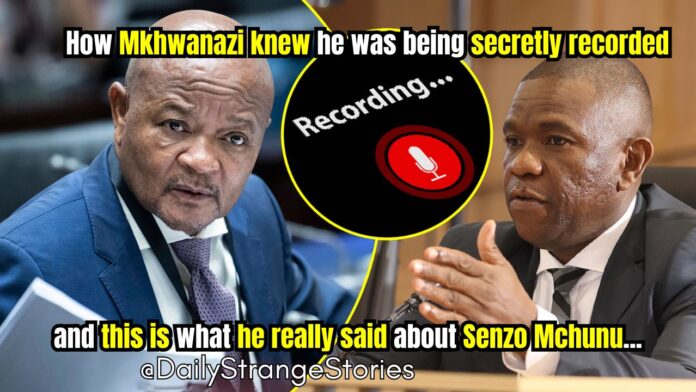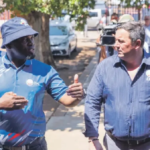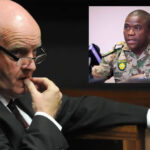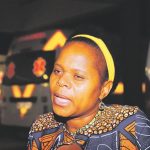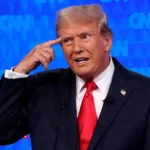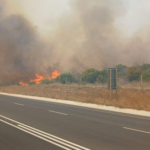In this true story that unfolds like a gripping political documentary, we dive into the breaking news that has shaken South Africa’s police and government circles — “How General Nhlanhla Mkhwanazi outsmarted Senzo Mchunu while being recorded.”
This is not just the latest news on South African policing — it’s a detailed exposé pulling back the curtain on secret recordings, power struggles, and betrayal at the highest levels of the South African Police Service.
At the center of this national shockwave is Lieutenant-General Nhlanhla Mkhwanazi, the astute and fearless Police Provincial Commissioner for KwaZulu-Natal, a man known for his integrity and strategic brilliance. The story takes an unexpected turn when he realizes his private conversations are being secretly recorded by none other than Suspended Police Minister Senzo Mchunu and his Chief of Staff, Cedric Nkabinde. What began as suspicion soon turns into shocking confirmation — Mkhwanazi was being spied on, with every word captured in a calculated act of political intrigue.
As revealed before Parliament’s Ad Hoc Committee, this real-life political drama exposes how Mkhwanazi uncovered the truth. Details from his private calls surfaced in the media almost instantly, proving there was a covert taping operation. Mkhwanazi’s instincts pointed to Cedric Nkabinde as the recorder and to Senzo Mchunu as the orchestrator. Later testimony confirmed his suspicions when Mchunu admitted that he had indeed advised Nkabinde to record their exchanges “as a precaution.”
What followed was a dramatic exchange between government officials, police insiders, and committee members like Ian Cameron and Khusela Sangoni-Diko, all weighed down by allegations, denials, and conflicting motives. Advocate Norman Arendse, as the committee’s evidence leader, also finds himself in the spotlight when Cedric Nkabinde demands a public retraction over remarks linking his name to cartel discussions in Gauteng — a move that exposes even deeper fractures within the institution.
This exclusive news documentary explores key moments from those recorded conversations — the strategic dialogue where Mkhwanazi raised serious concerns over the disbanding of vital task teams, accountability failures in Crime Intelligence, and the growing interference in police operations. He referenced past cases like that of former Intelligence chief Richard Mdluli, sharing how he once advised National Commissioner Khehla Sitole to ease Mdluli out of the police to safeguard critical state secrets. Mkhwanazi’s approach emphasized reform and integrity over personal loyalty, making him a rare voice of reason within a turbulent hierarchy.
Names like Theo from Cape Town, Karl, Moodley, Khan, and Sibiya emerge in this investigation — individuals connected to complex operations that highlight how internal politics intersect with law enforcement. Mkhwanazi even references Julius Malema, alluding to how political influence can shape internal outcomes in disciplinary cases. From former Police Commissioner Riah Phiyega and Minister Nathi Nhleko to President Jacob Zuma, the conversation connects past patterns to current events, painting a larger picture of institutional strife and political manoeuvring.
Through it all, Mkhwanazi remained composed, cautiously addressing Nkabinde and voicing frustration over the collapse of coordination between ministerial agendas and operational duties. His leadership instincts and foresight clearly show why so many regard him as one of the most respected officers in South African policing.
This true story — part breaking news, part investigative documentary — goes beyond headlines to reveal how Mkhwanazi’s intelligence outsmarted the covert surveillance orchestrated by Senzo Mchunu. It’s a deep dive into ethics, loyalty, and the delicate balance between political oversight and operational autonomy within law enforcement.
By examining the roles of Cedric Nkabinde, Shadrack Sibiya, Norman Arendse, Ian Cameron, Khusela Sangoni-Diko, and others, this video unravels an ongoing saga that could reshape South Africa’s policing leadership and accountability mechanisms.
As parliamentary inquiries continue and new evidence surfaces, the public is left to question: When those sworn to uphold justice turn their tools inward, who watches the watchers?
Watch to the end for key revelations from Mkhwanazi’s side of the story — what he really said when he realized he was being recorded — and decide for yourself: was this a justified precaution by Senzo Mchunu or an act of betrayal that could redefine political ethics in South Africa?

Follow Us on Twitter

